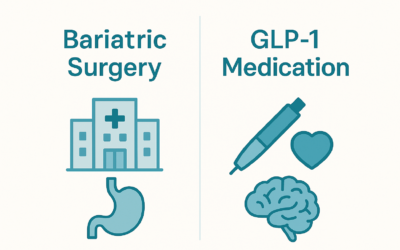By now, you’ve probably heard the buzz about Ozempic. What started as a medication for diabetes has quickly gained traction as a powerful weight loss tool. People are losing pounds, gaining confidence, and seeing numbers on the scale they haven’t seen in years. But as more people turn to Ozempic to kickstart their weight loss journeys, a question has started to pop up in conversations and online forums: Are people experiencing suicidal thoughts on Ozempic?
This isn’t just a throwaway concern. If you’re considering Ozempic — or if you’re already on it — you deserve to know the full story. Let’s talk about what’s really going on, because sometimes the issue isn’t just about the medication itself. It’s about everything that comes with losing weight quickly and dramatically, especially when it turns out to be a bigger life change than you anticipated.
The hidden side of weight loss: More than the number on the scale
There’s this idea we all buy into — whether we admit it or not — that losing weight is the key to unlocking a better life. If you’ve spent years or maybe even decades trying to drop those stubborn pounds, it’s easy to fall into the trap of believing that weight loss is your golden ticket to happiness. It’s the finish line you’ve been sprinting toward for so long, telling yourself that once you cross it, everything else will magically fall into place.
But here’s the thing: even if you reach your goal weight, it doesn’t mean that life will suddenly become a fairy tale. In fact, sometimes reaching that milestone can be jarring, with unexpected effects rippling out through parts of your life that you never anticipated. Losing weight changes your body, yes — but it can sometimes also upend your sense of self, your relationships, and your entire outlook on life.
You might assume that shedding the pounds will solve all your problems, but if that’s what you’re banking on, it’s worth taking a step back and reconsidering. Weight loss is just one piece of the puzzle, and achieving it won’t necessarily bring about the happiness you’re expecting. For some, it can even leave you feeling emptier than before, especially if you’ve poured much of your identity into the pursuit of a smaller body.
How weight loss can stir up unexpected emotions
Here’s where it gets complicated: losing weight doesn’t just change how you look in the mirror — it changes how you feel on the inside. And sometimes, those changes can bring up darker thoughts that catch you off guard.
Imagine spending years thinking, “If I could just lose this weight, I’d be happy.” But when the weight comes off, you’re still left facing the same insecurities, the same fears, the same anxieties. That can be tough to swallow. For some, this emotional disconnect — the gap between what they thought weight loss would bring and the reality they’re facing — can even lead to suicidal thoughts on Ozempic.
This is why we need to be honest about the psychological impact of weight loss. Rapid weight loss with medications like Ozempic isn’t just a physical change; it’s an emotional upheaval. And if you’re already dealing with mental health challenges, those feelings can become amplified in ways you might not expect.
Can Ozempic actually cause suicidal thoughts?
So, let’s address the question directly: Are people really experiencing suicidal thoughts on Ozempic, or is there more to the story?
The short answer is that, as of now, there isn’t any clear scientific evidence directly linking Ozempic to suicidal thoughts. Yes, there have been some reports from users who’ve experienced mood changes or feelings of depression while taking the medication, but it’s important to understand that these are isolated cases. Regulatory agencies like the FDA have looked into these concerns but haven’t found conclusive evidence that Ozempic is the cause.
While some people have indeed reported experiencing suicidal thoughts on Ozempic, current research hasn’t established a clear link between the medication and these mood changes. The reality is that Ozempic leads to rapid weight loss, which can trigger hormonal changes, shifts in brain chemistry, and emotional adjustments that go far beyond just the physical.
However, it’s crucial to distinguish between the medication itself and the broader context of the emotional journey that comes with drastic weight changes. For most people, Ozempic is a safe and effective tool for weight loss. But if you’re already dealing with underlying issues, the shifts that come with rapid weight loss — like changing self-image, altered social dynamics, or unmet expectations — might amplify feelings of anxiety or sadness.
How to protect yourself if you’re considering Ozempic
If you’re thinking about starting Ozempic, it’s about more than just preparing your body. It’s about preparing your mind, too. Here are some practical steps to help you navigate the journey:
- Be honest about your motivations: Why do you really want to lose weight? Are you expecting it to change more than just your appearance?
- Set realistic expectations: Understand that while weight loss can improve your health, it won’t fix everything. Be ready for the emotional adjustments that come with big changes.
- Check in with yourself regularly: If you’re concerned about the potential of experiencing suicidal thoughts on Ozempic, stay in close contact with your healthcare provider. Pay attention to how you’re feeling, both physically and mentally.
- Lean on your support system: Having people you trust — whether that’s friends, family, a therapist, or even your care coach — can make all the difference when you’re navigating this kind of transformation.
The bottom line: should you be worried?
To sum it up: There’s no solid evidence at this point linking Ozempic directly to suicidal thoughts. Most people who use Ozempic for weight loss find it safe and effective, especially when used under medical supervision. But it’s also important to acknowledge that significant life changes, even positive ones, can bring up unexpected feelings.
If you’re noticing changes in your mood or having thoughts that concern you, don’t hesitate to reach out for support. Your journey to better health shouldn’t come at the cost of your emotional well-being.
Learn more about Claya’s weight loss treatment programs.



